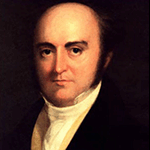
Levi Woodbury (1845-1851)
Lived from 1789 to 1851.
Early Life
Levi Woodbury was born in Francestown, New Hampshire to Mary and Peter Woodbury. Woodbury graduated from Dartmouth College with honors in 1809. After graduating, Woodbury briefly attended Tapping Reeve Law School in Litchfield, Connecticut, but later decided to complete his legal studies through an apprenticeship. He was admitted to the New Hampshire Bar in 1812.
Life and Political Career
Following his admission to the bar, Woodbury opened his own practice in New Hampshire. Soon after, he penned the Hillsborough Resolves, which defended the Madison administration for their decisions in the War of 1812. This marked the beginning of Woodbury’s political involvement. In 1816, shortly after the publication of Woodbury’s defense, he received an appointment to the state senate. Just one year later, he was appointed to the New Hampshire Supreme Court.
In 1823, Woodbury was elected as the Governor of New Hampshire. He failed to see much success, however, and was beaten in an election the following year. After his defeat, Woodbury became Speaker of the New Hampshire House of Representatives. From 1825 to 1831, he served as a United States Senator. Woodbury was later appointed as President Andrew Jackson’s Secretary of the Navy, prior to serving as Secretary of the Treasury under both the Jackson and Van Buren administrations.
Appointed to the Supreme Court
Following his tenure as Secretary of the Treasury, Woodbury once again served on the Senate until his appointment to the Supreme Court by President James K. Polk in 1846. Although he was on the Court for only six years, Woodbury penned major opinions involving the Contract Clause, the political question doctrine, slavery and the Commerce Clause.
Later Years
Woodbury ran for the presidency in 1848, but lost to Lewis Cass. He remained on the Court until his death in 1851 in Portsmouth, New Hampshire.
Notable Cases
Jones v. Van Zandt (1847)







